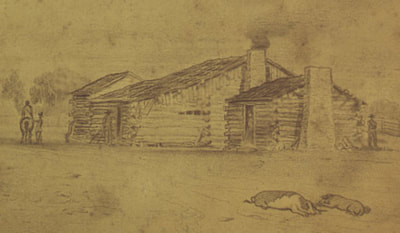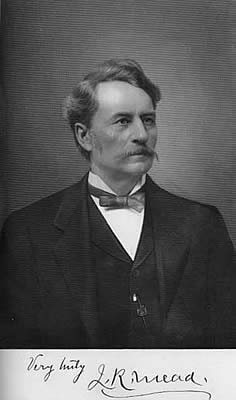History of Towanda Township, Kansas
By Vol. P. Mooney, Standard Publishing Company, Lawrence, KS 1916
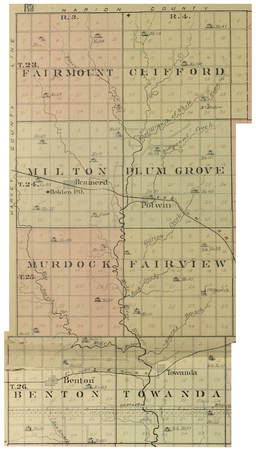
On August 23, 1867, Butler county was divided into four townships. Towanda township was bounded as follows: Commencing at the southeast corner of section 12, township 27, range 4, west to county line; north to northwest corner of county; east to range line, between ranges 4 and 5; south to place of beginning. The first township officers were appointed on April 14, 1868. They were as follows: Henry Comstock, trustee; John Wentworth, treasurer, and James N. Jones, clerk. The first election in the township was held April 6, 1869, and the following were elected: W. H. Avery, trustee; Henry Comstock, clerk; Milton Snorf, treasurer; Stark Spencer, justice of the peace; Amos Adams, constable.
The first white settler in Towanda township was C. L. Chandler, a native of Ohio, who had been stricken with the gold fever and had joined the forty niners and crossed the plains to California in quest of the yellow metal. Here he remained until 1857, when, not having acquired the wealth he hoped for, he started on his return home, following part of the way the old Santa Fe Trail. On reaching a point north of what is now Butler county, he chanced to meet a party of Indians, traders, who were returning from a trip through the southern part of their territory of Kansas. Their description of its beauty and apparent adaptability for settlement so interested him that in company with two others leaving the train of returning gold miners, they proceeded south, reaching the head of the Whitewater in September, 1858. Following the stream down to a point near the large spring flowing from the hill on which Towanda is now located, Mr. Chandler was so pleased with the country in general and the Whitewater valley particularly that he decided to settle here. A small log cabin was soon built on the bank of the little creek near the spring, in which he spent the winter of 1858 and 1859. This was the first house build in Towanda township. In the spring of 1859, Mr. Chandler returned to his old home in Ohio after his wife and two children, coming back to his claim with them after a few months' absence. The family remained here until 1862, when their claim was purchased by J. R. Mead. and they left the country, destination not known.
The first white settler in Towanda township was C. L. Chandler, a native of Ohio, who had been stricken with the gold fever and had joined the forty niners and crossed the plains to California in quest of the yellow metal. Here he remained until 1857, when, not having acquired the wealth he hoped for, he started on his return home, following part of the way the old Santa Fe Trail. On reaching a point north of what is now Butler county, he chanced to meet a party of Indians, traders, who were returning from a trip through the southern part of their territory of Kansas. Their description of its beauty and apparent adaptability for settlement so interested him that in company with two others leaving the train of returning gold miners, they proceeded south, reaching the head of the Whitewater in September, 1858. Following the stream down to a point near the large spring flowing from the hill on which Towanda is now located, Mr. Chandler was so pleased with the country in general and the Whitewater valley particularly that he decided to settle here. A small log cabin was soon built on the bank of the little creek near the spring, in which he spent the winter of 1858 and 1859. This was the first house build in Towanda township. In the spring of 1859, Mr. Chandler returned to his old home in Ohio after his wife and two children, coming back to his claim with them after a few months' absence. The family remained here until 1862, when their claim was purchased by J. R. Mead. and they left the country, destination not known.
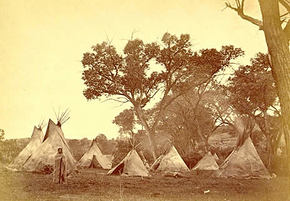 Comanche Indian Camp
Comanche Indian Camp
During the year 1858, and soon after Mr. Chandler's location at the Towanda spring, William Van, from Missouri, with his family, consiting of a wife, three sons and four daughters, arrived on the Whitewater and settled near another large spring a short distance below the Chandler home. Here a log cabin and other buildings were built. The family remained here until 1872, when they sold out and left. One other pioneer of Towanda township, Jay Que Hager, a single man, from Barry county, Michigan, came to the Whitewater the latter part of 1858 and located on what is now the southeast quarter of section 6, in Towanda township, and near the junction of the main Whitewater. A small log cabin was built, in which Mr. Hager lived two or three years, when he left, going to New Mexico, where he died soon after. This comprises all of the 1858 or first settlers of Towanda township. A. Mr. Jackson, wife and one child came into the township in 1859. They remained until 1862, when they left, going back East. But little seems to be known concerning them. At this time Kansas was yet a territory. The country was not surveyed and none of the settlers know the numbers of land on which they had located. There were still roving bands of Indians passing through and camping on the river, sometimes remaining there for weeks. While not really hostile, they were not desirable neighbors and caused considerable uneasiness to some of the whites because of their isolated location.
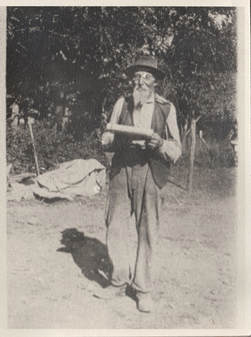 Daniel H. Cupp
Daniel H. Cupp
In 1868, a little party of immigrants from Fulton and McDonough counties, Illinois, consisting mostly of relatives and neighbors of the settlers, reached the Whitewater country. They had been preceded the previous year by two pioneer families from Hancock county, Illinois, Harrison Stearns, wife and three children, and Daniel Mosier, wife and six children, who had settled on the Whitewater near Towanda. The party of immigrants consisted of Gilbert Green, wife and eight children; Richmond Jones, wife and two children; J. G. Stearns, wife and four children; John Heath, wife and seven children, and C. Watrous, wife and four children. All of these settled in Towanda township and helped materially to found and build up the present thriving and progressive community. Their descendants are still living here, some of them on the original homesteads taken by their parents.
Probably the great spring which has gushed its torrents of cool water for ages was the cause of the founding of Towanda. Old plainsmen and hunters knew of it fifteen years before there was thought of settling the country. In those years, now known to only lengend, its volumes of water was greater than now. The Indians knew of it, and told the whites of it, long before it was seen by them. Here in the wide bottoms of the Whitewater, covered by abundant grass for their ponies, the Indians pitched their teepees. While the squaws stayed in camp looking after the domestic affairs, the braves were chasing the lordly buffalo that roamed the' prairie in countless herds. The Whitewater valley must have enchanted the first white men who beheld it. Its broad and fertile valleys and gentle undulating uplands that let the eye scan miles of its surface, had beauty and attraction irresistible. It is a stream abounding in crystal waters that never fail and fed by many tributaries like itself.
Daniel Cupp seems to have been the earliest comer in the Whitewater valley, at least, the first who came and stayed. That was in 186o, when he and his young wife braved the perils of the frontier and settled upon the farm they still possess and is their home. William Vann in the same year built his cabin further up the Whitewater. Mrs. A. G. Davis, now of Benton, is a child of this early comer. Cupp and a few others who came about 1860, have killed buffalo without number in western Butler. S. C. Fulton "struck the country" in 1863, and found them roaming in unnumbered thousands in what is now known as Sedgwick and Sumner counties, and west to the Rocky Mountains. The close of the Civil war left thousands of soldier boys with home ties broken. The government began giving away homesteads. The boys married the girls they left behind them when going to the war and came to Kansas. With each year after 1866 the tide of immigration grew higher until the climax was reached in 1870. Who does not recall the claim hunter, the home hunter, the land agent, the speculator, the scout, the cowboy, and the horseman, "the prairie schooner" that cut across the country without road, paying no attention. to aught save direction? Somebody has remarked that all there was to Kansas at that time was prairie grass, sunshine and wind - an abundance of all.
Early settlers in Towanda township were: 1860 - Daniel Cupp and Wright Goodale; 1865 - Andy J. and James W. Ralston (still there and prosperous), Dr. J. O. Burgher, who felt cramped at the encroachments of civilization and went to Wyoming a few years ago and died there; 1868 - Gilbert Green (who ran the stage and mail route between El Dorado and Wichita), Harrison Stearns, John Heath, S. S. McFarlane, Richard Jones, Dan. Mosier, Robert McGuin, J. W. Tucker, Isaac Mooney, Osburn Mooney, Horace Maynard, Simon Brair and Clark Waite, Willis Priest, William McDowell, Dr. William Snider, David Barnett, Dr. R. S. Miller, John and Joshua Shriver, James and Dr. J. D. Godfrey and their sister, Miss Nancy; Robert McClure, Lewis Hart, Duncan McLaughlin and Julius Straw, now all deceased except Joshua Shriver, who came in 1869, 1870 or 1871. There were many who came a yearn or two later. All these met the usual trials, difficulties and hardships incident to frontier life. All were poor. The rich did not care to face the discomforts of new lands. There was many a homesick heart, many sighs for the old homes amid the comforts and conveniences of the civilization they had left. Pioneering is especially hard and distressing on women. They had little to do with. Their duties were circumscribed by unhappy circumstances and conditions and their enforced idleness often led to repining. Many women who left homes where the comforts and even luxuries were plentiful and entered with their husbands into home building upon a raw sod and with limited means have testified that it was a most disheartening effort.
In the seventies and prior, long tedious trips were made to mill, forty, fifty, seventy five and even one hundred miles. Household necessities and pine lumber were hauled by teams an equal distance. Money was scarce. Interest was high. Labor at first brought good wages, especially that of the carpenter. Log cabins at first were the rule and they were built solid and comfortable. Settlements were along streams almost exclusively prior to 1870. Saw mills were freighted in and worked up native lumber into studding and rough boards. The fare was of the plainest, often consisting of "samp," a hard corn, julled and cracked, and buffalo "jerked" (dried) meat boiled in milk. This was a standard dish, and with corn bread and the sweetness that accompanies a good digestion and hunger, sustained and grew robust men and women. Of the early "kids" yon don't see any that are stunted from such fare. Clothes were of the plainest and would have condemned many a settler in polite society who is now well to do or Wealthy. Buggies and other road vehicles were rare. The big lumber wagons carried the family or a horse carried man and wife or lover and sweetheart.
TOWANDA.
Situated nine miles west and south of El Dorado, on a slightly elevated tract overlooking the Whitewater river, is Towanda, an incorporated town. It can be truthfully said that it is one of the best trading points, one of the nicest little towns, and has some of the most enterprising citizens to be found in Butler county or in Kansas.
In 1870 Rev. Isaac Mooney had surveyed and laid out in town lots, ten acres of what is now the southwest corner of Towanda and thereby became the father of the present bustling little village. Before this date J. R. Mead had established a trading post in the Whitewater valley about a quarter of a mile west of the present town site. At that time Towanda was what might be called.the trade center for the country within twenty miles, and stirring indeed were the doings of the old trading post of long ago. It was at that time the division point for two stage lines running over the western plain with headquarters at Emporia and Humboldt. It was also the camping ground for government trains and immigrant wagons on account of the beautiful spring bubbling out of the hill on the west side of town.
The first store building erected on the present town site of Towanda was built by G. W. Baker, in 1871, upon a lot south of the present M. E. church. The lot was given Baker by Isaac Mooney, who was engaged in the same business, as Baker expected to enter in the log house shown elsewhere in this work. The only instance on record where one man furnished another with means of entering into competition with the donor.
The next building was by L. Viets, father of C. L. Viets, of Wichita, and Allie Viets, of Augusta. He afterward sold his stock of goods to William McDowell and moved the building to Augusta. Then came R. S. Miller and J. H. Dickey, handling hardware and drugs, followed by II. Taylor & Son, general merchandise; J. M. Reed, A. Aikman, G. W. Stewart, blacksmiths and woodworkers, and many others.
Good business buildings have been erected in the past few years. In the residence section wonderful improvement has been made, new houses erected and a general prosperity seems to have taken the town. There is a full two story building built by the Masons of Towanda. They occupy the upper story for a lodge room, which is nicely furnished for the purpose. The lower story is occupied by Shriver & Glass with a large stock of hardware and implmenets, buggies and wagons, etc. G. W. Moore is the owner and editor of The Towanda News, a newsy home paper. The Knights of Pythias hall is a good brick building, the first floor of which is used for a storeroom and the second for a lodge room. It is owned by the order. The State Bank of Towanda, F. W. Robinson, cashier, and J. C. Kullman, president, is one of the solid institutions of the county Hand is doing a thriving business. J. C. Kullman, C. B. Sewart and L. C. Hill, general merchandise, and many other lines of business are represented, and all are prosperous.
Towanda township has about ten miles of the Missouri Pacific railway system, a good depot and shipping facilities. More fine draft horses, Holstein cows and other live stock are loaded and unloaded at this station for the Robinsons, Bishops, Girards and others than any other point in the county. Wichita, a town of some note, lies about twenty five miles south of Towanda. Towanda has always been a good trading point. It grew slowly. Once it received votes for the county seat. Its early social life was of that limited sort peculiar to people coming together from almost every point of the compass. The first school, the first church organization and other firsts are like unto the beginnings of all new countries. Rev. Isaac Mooney began preaching on his arrival at his new home and kept it up steadily until his death. He bought the splendid valley west of the village from Mead, filed on the one hundred and sixty acres east of it as his homtestead, donated the cemetery, platted the town, and gave away lots in encouragement of new comers. He has been fruitful in good works and faithful in every relation
From the camping place of the Indian and from a trading post, Towanda has grown to a tidy little village. In 1892 it was largely razed by a cyclone, but its people built it anew and better than before. It has two substantial churches; some fine and several substantial residences and many comfortable cottages. It is surrounded by a neat, beautiful and most fertile country. It has a fine brick school building with four departments, is one of the high schools in the county. The Masonic lodge, No. 3o, shows it to be one of the very oldest in the State; the G. A. R. and its auxiliary, the W. R. C., are,represented. Towanda citizens have been active aid prominent in county affairs. Hon. Isaac Mooney and his son, V. P. Mooney, Andy Swigett, M. D. Ellis and S. C. Fulton and R. B. Ralston and M. A. Wait have been called to official positions and performed their duties with fidelity and zeal.
Probably the great spring which has gushed its torrents of cool water for ages was the cause of the founding of Towanda. Old plainsmen and hunters knew of it fifteen years before there was thought of settling the country. In those years, now known to only lengend, its volumes of water was greater than now. The Indians knew of it, and told the whites of it, long before it was seen by them. Here in the wide bottoms of the Whitewater, covered by abundant grass for their ponies, the Indians pitched their teepees. While the squaws stayed in camp looking after the domestic affairs, the braves were chasing the lordly buffalo that roamed the' prairie in countless herds. The Whitewater valley must have enchanted the first white men who beheld it. Its broad and fertile valleys and gentle undulating uplands that let the eye scan miles of its surface, had beauty and attraction irresistible. It is a stream abounding in crystal waters that never fail and fed by many tributaries like itself.
Daniel Cupp seems to have been the earliest comer in the Whitewater valley, at least, the first who came and stayed. That was in 186o, when he and his young wife braved the perils of the frontier and settled upon the farm they still possess and is their home. William Vann in the same year built his cabin further up the Whitewater. Mrs. A. G. Davis, now of Benton, is a child of this early comer. Cupp and a few others who came about 1860, have killed buffalo without number in western Butler. S. C. Fulton "struck the country" in 1863, and found them roaming in unnumbered thousands in what is now known as Sedgwick and Sumner counties, and west to the Rocky Mountains. The close of the Civil war left thousands of soldier boys with home ties broken. The government began giving away homesteads. The boys married the girls they left behind them when going to the war and came to Kansas. With each year after 1866 the tide of immigration grew higher until the climax was reached in 1870. Who does not recall the claim hunter, the home hunter, the land agent, the speculator, the scout, the cowboy, and the horseman, "the prairie schooner" that cut across the country without road, paying no attention. to aught save direction? Somebody has remarked that all there was to Kansas at that time was prairie grass, sunshine and wind - an abundance of all.
Early settlers in Towanda township were: 1860 - Daniel Cupp and Wright Goodale; 1865 - Andy J. and James W. Ralston (still there and prosperous), Dr. J. O. Burgher, who felt cramped at the encroachments of civilization and went to Wyoming a few years ago and died there; 1868 - Gilbert Green (who ran the stage and mail route between El Dorado and Wichita), Harrison Stearns, John Heath, S. S. McFarlane, Richard Jones, Dan. Mosier, Robert McGuin, J. W. Tucker, Isaac Mooney, Osburn Mooney, Horace Maynard, Simon Brair and Clark Waite, Willis Priest, William McDowell, Dr. William Snider, David Barnett, Dr. R. S. Miller, John and Joshua Shriver, James and Dr. J. D. Godfrey and their sister, Miss Nancy; Robert McClure, Lewis Hart, Duncan McLaughlin and Julius Straw, now all deceased except Joshua Shriver, who came in 1869, 1870 or 1871. There were many who came a yearn or two later. All these met the usual trials, difficulties and hardships incident to frontier life. All were poor. The rich did not care to face the discomforts of new lands. There was many a homesick heart, many sighs for the old homes amid the comforts and conveniences of the civilization they had left. Pioneering is especially hard and distressing on women. They had little to do with. Their duties were circumscribed by unhappy circumstances and conditions and their enforced idleness often led to repining. Many women who left homes where the comforts and even luxuries were plentiful and entered with their husbands into home building upon a raw sod and with limited means have testified that it was a most disheartening effort.
In the seventies and prior, long tedious trips were made to mill, forty, fifty, seventy five and even one hundred miles. Household necessities and pine lumber were hauled by teams an equal distance. Money was scarce. Interest was high. Labor at first brought good wages, especially that of the carpenter. Log cabins at first were the rule and they were built solid and comfortable. Settlements were along streams almost exclusively prior to 1870. Saw mills were freighted in and worked up native lumber into studding and rough boards. The fare was of the plainest, often consisting of "samp," a hard corn, julled and cracked, and buffalo "jerked" (dried) meat boiled in milk. This was a standard dish, and with corn bread and the sweetness that accompanies a good digestion and hunger, sustained and grew robust men and women. Of the early "kids" yon don't see any that are stunted from such fare. Clothes were of the plainest and would have condemned many a settler in polite society who is now well to do or Wealthy. Buggies and other road vehicles were rare. The big lumber wagons carried the family or a horse carried man and wife or lover and sweetheart.
TOWANDA.
Situated nine miles west and south of El Dorado, on a slightly elevated tract overlooking the Whitewater river, is Towanda, an incorporated town. It can be truthfully said that it is one of the best trading points, one of the nicest little towns, and has some of the most enterprising citizens to be found in Butler county or in Kansas.
In 1870 Rev. Isaac Mooney had surveyed and laid out in town lots, ten acres of what is now the southwest corner of Towanda and thereby became the father of the present bustling little village. Before this date J. R. Mead had established a trading post in the Whitewater valley about a quarter of a mile west of the present town site. At that time Towanda was what might be called.the trade center for the country within twenty miles, and stirring indeed were the doings of the old trading post of long ago. It was at that time the division point for two stage lines running over the western plain with headquarters at Emporia and Humboldt. It was also the camping ground for government trains and immigrant wagons on account of the beautiful spring bubbling out of the hill on the west side of town.
The first store building erected on the present town site of Towanda was built by G. W. Baker, in 1871, upon a lot south of the present M. E. church. The lot was given Baker by Isaac Mooney, who was engaged in the same business, as Baker expected to enter in the log house shown elsewhere in this work. The only instance on record where one man furnished another with means of entering into competition with the donor.
The next building was by L. Viets, father of C. L. Viets, of Wichita, and Allie Viets, of Augusta. He afterward sold his stock of goods to William McDowell and moved the building to Augusta. Then came R. S. Miller and J. H. Dickey, handling hardware and drugs, followed by II. Taylor & Son, general merchandise; J. M. Reed, A. Aikman, G. W. Stewart, blacksmiths and woodworkers, and many others.
Good business buildings have been erected in the past few years. In the residence section wonderful improvement has been made, new houses erected and a general prosperity seems to have taken the town. There is a full two story building built by the Masons of Towanda. They occupy the upper story for a lodge room, which is nicely furnished for the purpose. The lower story is occupied by Shriver & Glass with a large stock of hardware and implmenets, buggies and wagons, etc. G. W. Moore is the owner and editor of The Towanda News, a newsy home paper. The Knights of Pythias hall is a good brick building, the first floor of which is used for a storeroom and the second for a lodge room. It is owned by the order. The State Bank of Towanda, F. W. Robinson, cashier, and J. C. Kullman, president, is one of the solid institutions of the county Hand is doing a thriving business. J. C. Kullman, C. B. Sewart and L. C. Hill, general merchandise, and many other lines of business are represented, and all are prosperous.
Towanda township has about ten miles of the Missouri Pacific railway system, a good depot and shipping facilities. More fine draft horses, Holstein cows and other live stock are loaded and unloaded at this station for the Robinsons, Bishops, Girards and others than any other point in the county. Wichita, a town of some note, lies about twenty five miles south of Towanda. Towanda has always been a good trading point. It grew slowly. Once it received votes for the county seat. Its early social life was of that limited sort peculiar to people coming together from almost every point of the compass. The first school, the first church organization and other firsts are like unto the beginnings of all new countries. Rev. Isaac Mooney began preaching on his arrival at his new home and kept it up steadily until his death. He bought the splendid valley west of the village from Mead, filed on the one hundred and sixty acres east of it as his homtestead, donated the cemetery, platted the town, and gave away lots in encouragement of new comers. He has been fruitful in good works and faithful in every relation
From the camping place of the Indian and from a trading post, Towanda has grown to a tidy little village. In 1892 it was largely razed by a cyclone, but its people built it anew and better than before. It has two substantial churches; some fine and several substantial residences and many comfortable cottages. It is surrounded by a neat, beautiful and most fertile country. It has a fine brick school building with four departments, is one of the high schools in the county. The Masonic lodge, No. 3o, shows it to be one of the very oldest in the State; the G. A. R. and its auxiliary, the W. R. C., are,represented. Towanda citizens have been active aid prominent in county affairs. Hon. Isaac Mooney and his son, V. P. Mooney, Andy Swigett, M. D. Ellis and S. C. Fulton and R. B. Ralston and M. A. Wait have been called to official positions and performed their duties with fidelity and zeal.

